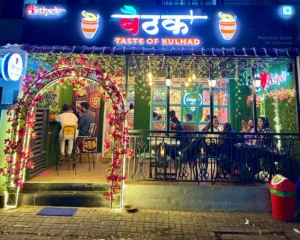In India, tea is not just a beverage; it is an emotion woven into the fabric of everyday life. From the morning cup shared at home to the steaming glass enjoyed at roadside tapris, chai fuels conversations, connections, and comfort across generations. IBEF – Indian Tea Industry Overview
In recent years, this timeless tradition has taken a modern twist with the rise of organized tea cafés like Chaayos, Chai Point, and countless boutique lounges reimagining the humble chai experience. Beyond nostalgia, these cafés are turning into one of India’s most promising small business opportunities, combining culture with commerce. This blog explores why tea cafés are becoming highly profitable ventures and why now is the perfect time to invest in one.

India’s bond with tea runs deep, making it the second-largest producer and consumer of tea in the world. Statista – Tea Industry in India: Statistics & Trends
Whether in a bustling college canteen, a quiet office pantry, or a roadside stall, chai bridges every social and economic divide. It is more than just a drink; it is a ritual that brings people together, symbolising warmth, comfort, and conversation. For generations, tea has fueled friendships, business deals, and daily routines alike. Interestingly, India consumes over 80% of the tea it produces, reflecting its deep cultural connection to the beverage. In recent years, this traditional love for chai has evolved from unorganised tea stalls to modern, experience-driven tea cafés that cater to the tastes and expectations of today’s consumers.
Changing Consumer Lifestyles: The Rise of Café Culture
- Rapid urbanisation, higher disposable incomes, and digitally driven lifestyles have transformed how Indians spend their leisure time, creating a growing demand for comfortable “hangout spaces.”
- Unlike expensive coffee chains, tea cafés offer a more affordable and culturally familiar alternative, attracting a wider audience.
- Millennials and Gen Z consumers increasingly prefer cozy, casual spaces where they can work remotely, meet friends, or simply unwind with a cup of chai.
- Tea cafés perfectly fit into the “affordable luxury” category by blending traditional comfort with a modern ambience that feels both inviting and aspirational.
- Social media has further fueled this trend, with aesthetically designed interiors and creative presentations making tea cafés highly shareable and appealing to younger audiences seeking Instagram-worthy experiences.
The Business Potential: Why Tea Cafés Are Highly Profitable
Tea cafés offer one of the most promising business models in India due to their simple operations and impressive profit margins. With low raw material costs for essentials like tea leaves, milk, and spices, every cup sold generates a significant return. The menu is typically straightforward, making it easy to standardize, replicate, and scale across locations. Entrepreneurs can tap into multiple revenue streams, including dine-in services, takeaways, online deliveries, and even retail tea products. Compared to coffee cafés, where ingredient costs and pricing sensitivity are higher, tea cafés deliver better profitability with lower risk. The investment required is modest, often manageable within a small space and with limited staff. Moreover, the concept attracts a loyal, repeat customer base that ensures steady revenue. The booming franchise model further adds to the appeal, allowing regional and national tea brands to expand rapidly across urban and semi-urban markets.
Innovation in the Cup: Blends, Flavors, and Experiences
- Tea cafés are reinventing traditional chai by introducing creative innovations that appeal to modern tastes and preferences.
- They offer a wide range of flavored teas such as tulsi, hibiscus, lavender, and Kashmiri kahwa, adding variety to the classic cup.
- Fusion drinks like chai lattes, bubble teas, and iced teas bring a global twist to India’s favorite beverage.
- Health-conscious consumers are drawn to options like green tea, herbal infusions, and sugar-free blends that combine taste with wellness.
- Many cafés enhance customer engagement through personalized experiences, including live brewing counters, tea-tasting sessions, and storytelling centered around regional blends.
- The use of locally sourced and organic ingredients resonates with eco-aware customers.
- Such innovation not only keeps menus exciting but also helps tea café brands stand out in a competitive market and build strong customer loyalty.
Beyond Tea: Smart Menus and Add-On Offerings
Successful tea cafés go beyond serving chai by curating smart, complementary menus that boost revenue. Offering popular food pairings such as samosas, sandwiches, parathas, and baked goods increases the average billing value per customer. Many cafés also introduce breakfast combos, evening platters, and meal boxes that cater to different times of the day, enhancing overall profitability. Value-added products like bottled iced teas, tea gift boxes, and subscription-based tea packs create additional income streams. Seasonal and festive menus keep customers engaged and encourage repeat visits. By diversifying their offerings, tea cafés attract a wide range of customers, from students to professionals, and ensure consistent footfall throughout the day.
Franchise & Expansion Opportunities
Leading tea café chains such as Chai Sutta Bar, Baithack, MBA Chai Wala, Tea Trails, and Chai Point have transformed the humble chai business into a thriving franchise industry. Their success has shown that franchising offers a proven business model backed by strong brand recognition, standardized operations, and ongoing support, making it an attractive option for new entrepreneurs.
What makes this opportunity even more appealing is its affordability. Many tea café franchises are available in the Rs. 5–20 lakh investment range, opening doors for small-town investors. These brands are expanding rapidly across Tier II and Tier III cities, while independent cafés are also scaling through local partnerships, event tie-ups, and catering services, ensuring continuous growth and wider reach.
The Future Outlook: Brewing Bigger Dreams
India’s organized tea café industry is poised for remarkable growth in the coming years as consumer demand continues to evolve. Emerging trends such as AI-driven customer experiences, wellness-focused teas, and hybrid café-retail formats are shaping the next phase of innovation. Investors and startups are increasingly turning their attention to the tea ecosystem, recognizing its scalability and steady profitability. With a growing shift toward conscious consumption and healthier beverage choices, tea cafés are set to remain both relevant and resilient. The tea café revolution is only just beginning, and entrepreneurs who step in now have the perfect opportunity to brew long-term success in this thriving market.
